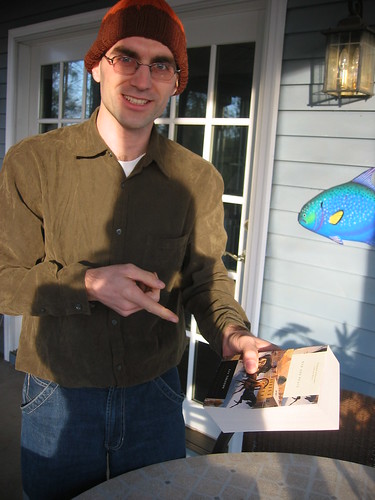
{Photo by rocketlass of me saying, "Have you read War and Peace? I think you'd really like it."}
I first read War and Peace at age twenty-two, in a white heat that saw me do nothing for ten days but go to work and read. It was my first encounter with Tolstoy, and I was most impressed by his more philosophical passages, the reflections on history in which his narrative voice takes on the confidence and timbre of a god's. The second time I read it, not even five years later, was prompted by my first reading of Anna Karenina, and, still under the spell of that book, I found myself responding to those parts of War and Peace that were most like it--the quotidian social fussing and emotional turmoil that Tolstoy depicts so well--while finding Tolstoy's disquisitions on history almost intolerable.
Now, at thirty-five, I'm reading it again--brought back to it by Adam Zamoyski's wonderful book on the Congress of Vienna, Rites of Peace--and, somewhere in the middle of the book, I find myself . . . somewhere in the middle. While I'm still most drawn to the Tolstoy of the small detail--Bilibin's deep wrinkles, which "always looked as neatly and thoroughly washed as one's fingertips after a bath"; the old woman knocked down while trying to catch a biscuit from Tsar Alexander's hand who "did not consider herself defeated, though she was lying on the ground"; the way that Andrei, reunited with Pierre,
spoke eagerly and quickly, like a man who has not spoken for a long time. His gaze became the more animated, the more hopeless his opinions were.But I also find that my patience for Tolstoy's big-picture narrative voice has increased. Oh, I still find those passages a bit tiresome, their irony too often of the heavy-handed, "Ha! See!" variety, their certainty about our uncertainty reminiscent of all the contradictions and stubbornness that seem to have made Tolstoy such an impossible person to deal with. Yet this time around I no longer see them as a rupture, a distraction from the story, at least when they're at their best: for the first time, I think I'm seeing War and Peace whole, finally see Tolstoy's vision of the quotidian and the epic truly intertwined, indistinguishable, both simultaneously out of our control yet impossible not to obsess over. I have long thought of Tolstoy's approach to his characters being god-like in its empathy; the philosophical passages, in a sense, remind us of just how a god, knowing better, might try in vain to talk himself out of once again being sucked into actively caring about the petty foibles and aspirations of his creation.
That lack of frustration, that willingness to accept Tolstoy's inclusive, syncretic, capaciousness, has freed me to enjoy the combination of assurance and irony in a passage like this one, which last time through would have driven me up the wall:
Pfuel was one of those hopelessly, permanently, painfully self-assured men as only Germans can be, and precisely because only Germans can be self-assured on the basis of an abstract idea--science, that is, an imaginary knowledge of the perfect truth. A Frenchman is self-assured because he considers himself personally, in mind as well as body, irresistibly enchanting for men as well as women. An Englishman is self-assured on the grounds that he is a citizen of the best-organized state in the world, and therefore, as an Englishman, he always knows what he must do, and knows that everything he does as an Englishman is unquestionably good. An Italian is self-assured because he is excitable and easily forgets himself and others. A Russian is self-assured precisely because he does not know anything and does not want to know anything, because he does not believe it possible to know anything fully. A German is self-assured worst of all, and most firmly of all, and most disgustingly of all, because he imagines that he knows the truth, science, which he has invented himself, but which for him is the absolute truth.Which also makes me wish Tolstoy had lived long enough to grapple with Americans--what would he have said about our self-assurance? An American is self-assured because he knows that everyone else has had the same chance he's had, and if he's come out on top it's through his own hard work and skill? Oh, to hear Tolstoy's thoughts on Melville!
When I read W&P at age 18 or so, I was surprised by how much more I liked the war parts than the peace parts - contemplating near-future re-read (+ AK), will let you know what I think...
ReplyDeletePrivet!
ReplyDeleteIn modern Russian it's same word for both "Peace" and "World" notions ("Mir")
however, there WERE two words at Tolstoy time - spelled differently before Russian language reformation in 1920s.
Strangely, this still doesnt clear up Tolstoy's own disambiguation for in his letters he himself would normally refer to his novel in Russian as Peace and French as «La guerre et la paix».
Still, the first two Russian national-wide innitial printouts of his book would have 3 books titled as Peace and the fourth as World and Tolstoy personally seemed to never object to that!
Just think you guys might never know of the issue at all).
for more details google translat the russian wiki article on toe book
Cheers!